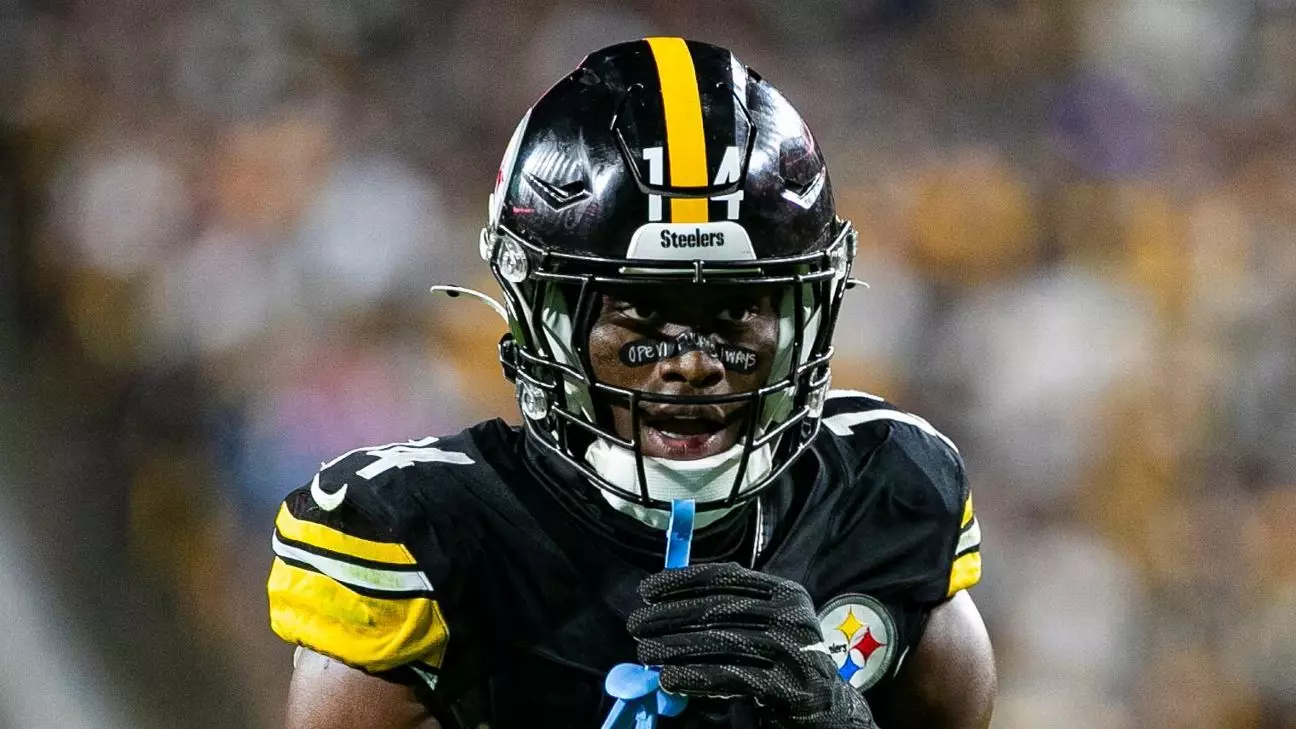George Pickens, the Pittsburgh Steelers wide receiver, stands at an intersection of visceral talent and complex emotions. Following the team’s recent loss to the Dallas Cowboys, Pickens made headlines for more than just his on-field performance. From the bold message displayed on his eye black to a heated altercation with Cowboys defensive back Jourdan Lewis, Pickens’s actions raise questions about player conduct and league regulations. However, it’s essential to view these incidents within the broader spectrum of competitive sports where emotion, strategy, and personal expression collide.
Pickens’s choice of eye black, emblazoned with the message “Open F—ing Always,” has sparked much discussion. In response to inquiries regarding his controversial statement, he nonchalantly downplayed its significance, claiming it was merely eye black and insisting that he had no expectation of scrutinies or repercussions. This dismissal aligns with a commonly held notion among athletes: that personal expression adds another layer to the game, albeit a risky one given league policies aimed at maintaining professionalism on the field.
The NFL maintains strict guidelines governing uniform appearance, which includes controlling personal statements made by players. Consequently, the league is likely to scrutinize Pickens’s eye black for potential violations. Yet, when confronted with precedents—like his teammate Cameron Heyward’s fine for similar infractions in 2015—Pickens appeared unfazed, focusing instead on the present dynamics of the game. This reaction highlights a crucial aspect of athlete mentality; many players may choose to prioritize their personal expression over adhering to policies that they are either ignorant of or choose to ignore.
While it’s easy to vilify Pickens for potential misconduct, it’s vital to consider the broader implications. Does this incident reflect a generational shift in how professional athletes perceive their roles as both competitors and individuals? In an era where athletes are increasingly vocal about their identities, political beliefs, and personal narratives, perhaps the NFL’s policies need to evolve alongside the players it governs.
Beyond the spectacle of the eye black, Pickens’s limited offensive snaps against the Cowboys stirred further intrigue. Despite a strong performance in earlier games, he was on the field for only 59% of offensive plays, marking a career low. This decision to limit his involvement raises questions about coaching strategies and the rationale behind such tactical choices.
Offensive Coordinator Arthur Smith clarified that the reduced snap count was part of a deliberate game plan designed to optimize team performance. He acknowledged that player usage would vary based on specific matchups, underscoring that sports are as much about strategy and planning as they are about raw talent. While Pickens may be frustrated with the situation, communicating such feelings to the coaching staff could prove crucial for his future involvement in plays.
The intricate dynamics of athlete-coach interactions reflect the essential nature of teamwork. Both Pickens and Smith’s responses to the situation emphasize the importance of mutual understanding and respect, reinforcing the idea that a successful team must navigate the complexities of individual aspirations within a collective goal.
Pickens’s emotional state during the game was evident; his visible frustration raised eyebrows. Smith, however, explained that such reactions are a common aspect of high-stakes competition. Every player copes with the emotional rollercoasters that come with sports differently, and what may seem like a volatile outburst could simply stem from the intense pressure of the game. It is here that the emotional intelligence of teammates like quarterback Justin Fields becomes significant; Fields emphasized the importance of maintaining a positive rapport with Pickens, especially considering their long-standing history together.
For any athlete, the capacity to manage emotions in a high-pressure environment is crucial. The mention of referees influencing players’ conduct reflects a common frustration among athletes. By attributing the outcomes of certain plays to officiating errors, Pickens directs his focus outward, temporarily alleviating personal dissatisfaction with his performance. This dynamic underscores a complex relationship where emotional management and competitive spirit are constantly at odds.
George Pickens represents the multifaceted nature of modern sports. His recent actions—whether seen as defiant, strategic, or both—illustrate the tension between personal expression and institutional policies. Simultaneously, the interplay between player emotions and coaching strategies further complicates the narrative surrounding performance and teamwork in professional football. As the season progresses, understanding how players like Pickens navigate these challenges will provide valuable insight not only into their personal journeys but also into the evolving landscape of professional sports.


Leave a Reply